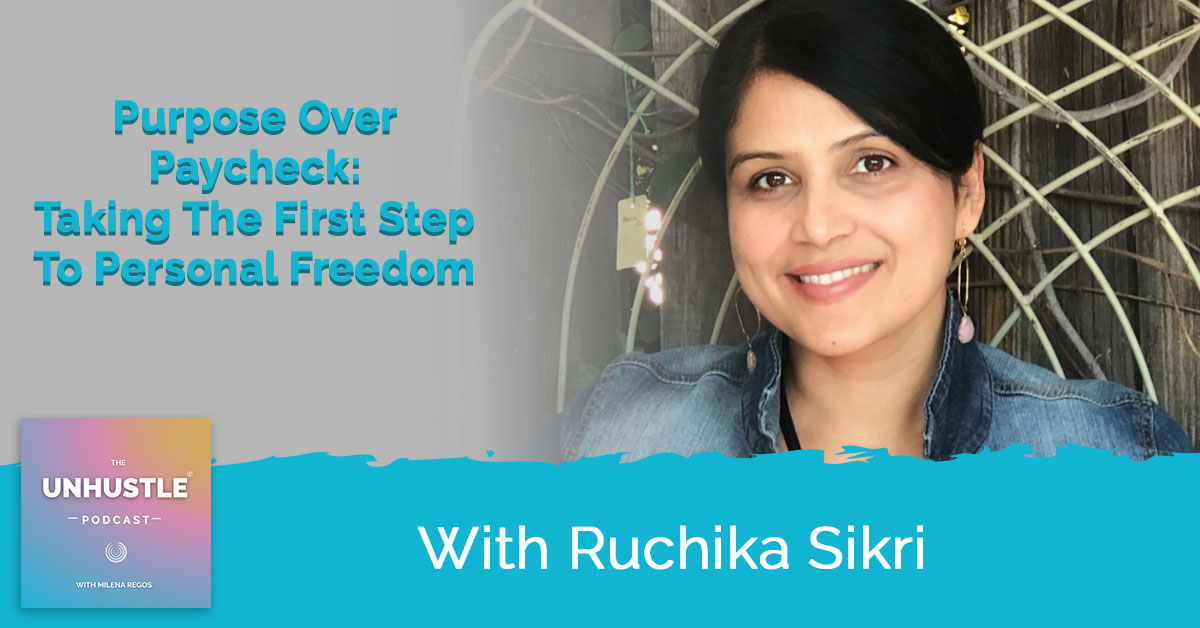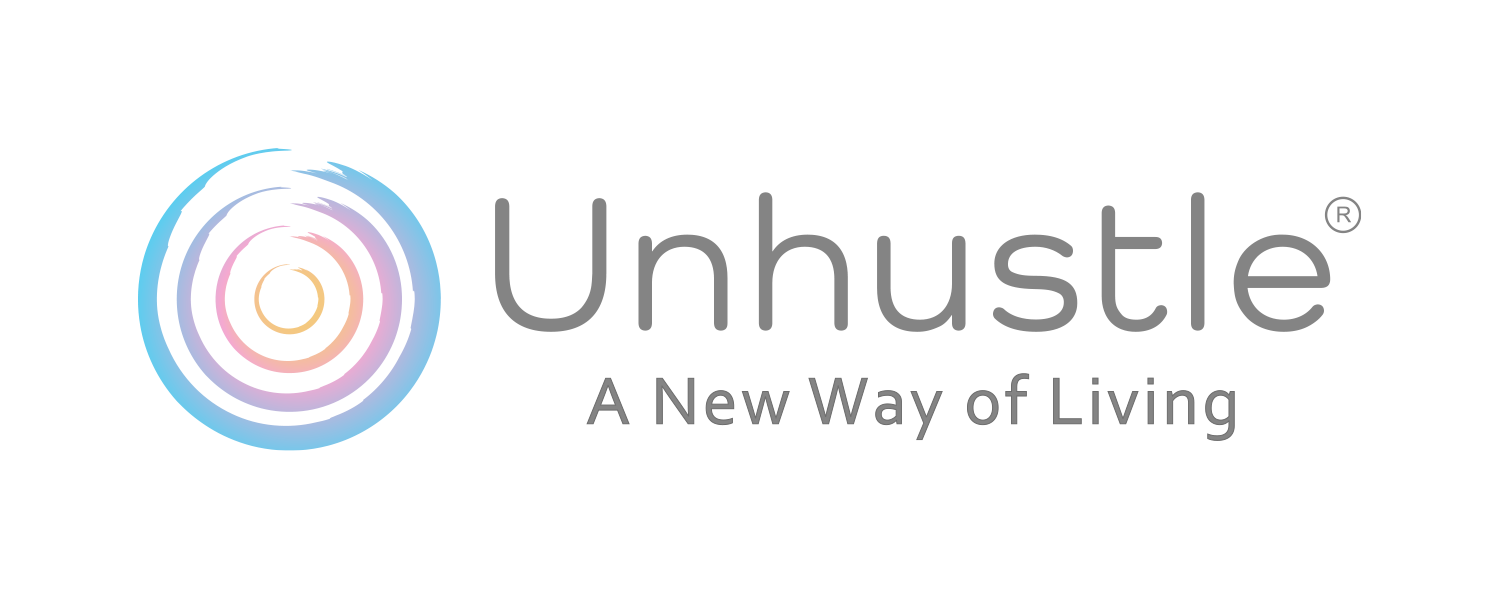

How do you define your work? Is it something you’re truly passionate about, or is it just a means to survive? Ruchika Sikri has found her purpose and has chosen to live above and beyond the fulfillment a paycheck offers. She is the former head of wellbeing and mindfulness at Google. After a successful corporate career, she follows her life’s purpose and mission to create a better world by supporting mindfulness, compassion, and wellness. In our first episode, she joins Milena Regos to talk about her new sense of determination and freedom. Listen in as they discuss how self-care and self-awareness can lead you to a greater purpose.
—
Listen to the podcast here:
Purpose Over Paycheck: Taking The First Step To Personal Freedom With Ruchika Sikri
How Former Head Of Wellbeing And Mindfulness At Google Quit Her Job To Make A Bigger Difference
I’m Milena Regos. After many years of building a marketing career, I decided to step into a bigger purpose and started Unhustle, a revolutionary approach to how we work, live, and play. In this episode, I have conversations about why the way we work is not working and what to do instead. I talk with powerful game-changers, rebels, and pirates about getting out of the hustle and grind to design sustainable life, work, and play, and replace hustle culture with human-centered culture. You can redefine success and fit your work into your life instead of the other way around for more well-being, fun, and fulfillment while still making a powerful impact.
—
I’m very pleased to be joined by Ruchika Sikri. She’s the Founder of Mandala Ventures and Wisdom Ventures. After a successful corporate career of many years at Google, Microsoft, and Cisco, she’s following her life’s purpose and mission to create a better world by supporting globally accessible mindfulness, compassion, and wellness offerings and making technology work for humanity instead of the other way around. I’m super excited to have this conversation with her.
I’m so excited you’re here with me. I can’t wait to dive into this conversation with you. I want you to share your story of how you woke up one day and decided, “I’m done. I need to move on.” I know you’ve been with Google for many years. That has been a great journey for you. You and I have talked about how grateful you are for all the experiences you had at Google, but at some point in time, you decided, “Enough. It’s time to pursue a bigger purpose in life.” What was that bigger purpose? Please, share a little bit of your background with all your years of experience at Google.
Thank you for having me with you. It’s an honor and a pleasure to be here. My real awakening happened when I found the practice of self-care and self-awareness, and that happened at Google for me. I’m incredibly grateful and feel hugely privileged that I was at the right place and right time. As challenging life always is, it’s also always trying to show us the opportunity to learn from those challenges.
My journey into mindfulness and meditation started at Google several years ago. I was at Google for fifteen years. I was practicing a lot of the well-being practices there in the middle of a very hustling culture to play on the movement. To be honest, I was enjoying the ride of this hustle. I was drinking from a fire hose, learning a lot, and at the same time, struggling with my wellness and with the sense of balance and harmony. I transitioned into running the well-being learning experiences for our colleagues at Google for eight years.
Why did I leave Google, and when did the awakening come? My time, job, and role at Google concluded. We all feel like, “This is what I’m doing. I’m going to continue doing it all my life.” Self-awareness leads you into a place where you know the time has come, and you bow down to all the great things, places, and people around that taught you, and then you look at the horizon and see, “What’s coming up next for me? What is calling me?” It was pretty clear to me that it was time to expand my wings and fly away and see where I wanted to land next. That’s how I left with a lot of gratitude in my heart, a lot of learning in my life, and a lot of freedom that I’m enjoying now.
What is on the horizon for you? What is the purpose that you’re stepping in?
There are a lot of different things. It has been a couple of months since I left. To be honest, I’m hustling for a very good sense of purpose. My life is very aligned with my sense of being or purpose, and that is about bringing more mindfulness, compassion, and human connection to many people around the world.
As challenging as life is, it’s always trying to show us the opportunity to learn from those challenges.
I come from the place of being a beneficiary of it being given the gift of practice, the gift of community, and the gift of knowledge that keeps sharing and giving more. The way I’m approaching this is to see how I can take all of that experience and passion and support more organizations in helping them enable their communities from within to empower their employees, unhustle, or become more self-aware and make more effective choices about their work, home, personal life, or howsoever they want to approach. That’s one thing.
I’m also supporting a lot of technological advancement in the wellness space, be it the wearables that are helping and giving some good information on our health, some apps that are very instrumental, or online communities that are also supporting each other. Those are a couple of main areas coming up, and seeing what my role is in those areas is.
From the website, it looks to me that you’re doing a lot of advising for human-type technologies. Can you explain what human technology is?
It’s good for human technology. I worked in the technology industry throughout my 25 years of corporate experience. I started my career at Microsoft and worked at Cisco, and then I went to Google. I have high regard for technology. As great as it is, and we have experienced it in COVID times, we were able to connect with each other and with people we’ve never connected with because Zoom and Google Meet was available. It has truly transformed our lives for a lot of good things, but there are some harmful things happening intentionally and unintentionally through technology as well.
What I’m trying to be helpful about is how we inform the direction of technology? It’s supporting human beings’ health, helping them flourish, thrive, and infusing their life with vigor and vitality rather than taking away from it. As we’ve seen with the technology adoption, especially with smartphones, it has gone up alongside loneliness, and there are more subscribers for Facebook and Instagram. I have nothing against any of these companies. I’m a subscriber to it. I have accounts everywhere.
I’m grateful that I can connect with people around the world. The more friends we have on Facebook, Instagram, Snapchat, and TikTok, we’re also having less and less real human interaction, so my hope with this work is what can technology do to enable us to reconnect with our true selves and then connect with each other and find a way from this online world to go back into the offline world? That’s where real life happens. It’s sitting with a friend, having a cup of tea, having dinner with someone, and sharing a moment with someone. That’s my goal.
Why do you think that is? It’s something while I’ve been working on the Unhustle book have seen as well in the research that loneliness has gone up. It’s a pandemic. Especially with the new generation, I like to refer to them as iHumans because their digital lives come first before real lives. They’re born with the phone in their hands. They’re born on Instagram.
They took their first breath on Facebook whether they wanted it or not. Where do you see this new generation of people going, and how is this going to work with technology in the workplace, work from home, and all these trends that we’re seeing? People want to work remotely and have more flexibility. They don’t necessarily want to go back to an office. Those are a lot of questions I launched at you. How do you see the future of work?


It’s still to be decided, and it’s going to be evolutionary from here on. A lot of people are making assessments like, “It’s going to be a hybrid world.” Clearly, it is going to be a hybrid world. Partly, it was a hybrid world even before the pandemic came, but it wasn’t to this great extent. Work from home was not a foreign concept before the pandemic came.
Our workplace humanity was already moving towards that, and it got exaggerated because of COVID. Everyone was working from home, and now that the offices are opening, which we’re still not sure of because of the Delta variant being on the rise, every country is in a different place, different time, and has a different intensity of managing and tackling COVID in their areas. We can have opinions and conclusions based on our decisions on the data, but in my mind, it’s undecided.
However, I don’t know if it’s COVID-related or not, but there is a real evolution happening in the future of work. I was reading an article that said four million Americans have resigned from their full-time work this 2021. That’s unprecedented. We have unemployment challenges when people can’t find a job, so it’s quite interesting to sit back and observe why people are leaving their job.
I’m one of those four million people. I left a job this 2021. The work has been redefined with this whole gig economy where people can get projects on Upwork, drive an Uber or Lyft, or do any small projects. I could be an administrative business partner, have five clients that I work with, and make enough money than having a full-time administrative business partner role for one organization and go through all of the challenges that come with being part of an organization.
Also, the benefits too. Don’t get me wrong. I’ve been living on the benefits of corporates for a very long time, so I know how much that is appreciated. I have a daughter who’s ready to go to college as well. I look at this generation, and I don’t see them looking at work the way I looked at it. I was like, “I’m going to go to college, find a good job, have a predictable income, and know which apartment I can live in and how much food I can have on a plate. When can I buy a car?” They don’t care about those things. They’re like, “I don’t need to learn how to drive. I can Uber to go from one place to the other.”
They’re like, “I can rent an Airbnb. I don’t need a house.”
They’re like, “I don’t need a full-time job. I can get five jobs. I can have no boss or five bosses.” It distributes the sense of being, and the choice that people have has gone up. It is such an interesting field of future work. How will this get defined? I’m sure some theories will come out about this. If we can be an observer and read up and talk to the younger generations, we know that it’s not going to be the way it was many years ago. It’s going to be very different.
Evolutionary psychology also tells us that’s how it is. When we had factory workers, they worked very differently. They worked from 9:00 PM to 5:00 PM. They would shut down after 5:00 PM, watch TV, read the newspaper, drink, or eat food. We don’t do that. We’re constantly on. It could be 2:00 AM, and I could be working on a project. In the coming years, it’s not going to look the same as it is now, and we’re seeing some signs of it already.
Taking responsibility, drawing the boundaries, and taking care of yourself come first.
I’ve been doing digital marketing for many years, trying to tell people that they need to do more stuff online. Now, overnight, everybody has decided to go online and try to shift their focus to online business models of some sort. I find it very interesting. On top of that, this new generation of humans wants flexibility and more freedom. They want to have experience now instead of working 24/7. All of these things are going to redefine how we live, work, and play.
I find it fascinating to look at, research, and see what companies are doing. Big companies like Google are run by native analogs saying, “We need to get everybody back in the office.” That’s not going to work for that new generation. There are companies like JP Morgan saying, “We need to work 90 hours a week. In that way, it won’t take you five years to get to where you need to be to know your job.” I find that fascinating because people, especially the young generation, are going to define how they live first and then figure out how they want to supplement their lifestyle.
Those are good, important points. At an organizational level, it’s a mindset shift. When these changes come, organizations need to learn and adapt. The wise organizations are going to be open to that. That’s how they will keep the talent. Otherwise, job opportunities are available if you have the skills, capabilities, experience, motivation, and you’re passionate and creative. Any of us can find a job to do, and at the same time, it’s for organizations to keep and retain that good talent for them to think about creative ways on what workplace flexibility looks like and how we then pay people.
Let’s say someone in their organization wants to work 3 months from London, 3 months from India, 3 months from Australia, and 3 months from America. How should that employee be paid? I spent a lot of time in HR, where we did compensation reviews for employees and performance management. It would be a big challenge if I were still in that position for me to say, “I don’t know half of the people in my company. Where is their place?”
The ranges of pay grades in India are very different as compared to when you live in California, where you pay so much money to even rent a place. The cost of living impacts our pay grades. It’s a complex challenge, and that’s why I say it is going to take time for people to find the new norms. The working generation is finding their new norms. They’re pretty clear about it. Most of them are, and they’re seeing it in their behavior and choices. For organization leaders to tune into that and find solutions, it’s going to come. I don’t know if we’re there yet.
I don’t think we’re there yet, but it’s coming for sure. Tell me from your perspective about well-being and mindfulness in the workplace. Why is well-being so critical for companies to consider? How does it affect the bottom line of a company?
It has a very direct relationship. If I’m not feeling well as an employee or if I am not in good mental, physical, or emotional health, you’re getting a very less percentage of my capability that I can provide to you. I’m not saying that organizations are the only drivers or owners of well-being. If I can speak to how I look at well-being in organizations and then come to the answer to the question that you’re asking me, it rests at three levels.
The first level is that an organization should take responsibility for their employees’ well-being. The dog-eat-dog culture is not sustainable. If there’s so much competition and the people are having a hard time breathing and working as creatively as they can, then everybody is experiencing a loss. It’s not just that individual who’s feeling that. The organization needs to give some options for employee well-being. Typically, it’s caring for their physical well-being. They’re feeling safe at work. They have ways to keep their body and mind healthy and provide some learning options.


Anything an organization can do should be budgeted. Create some budgets for taking care of their employees’ well-being because if they are not, you’re not getting the full potential out of them. I don’t say it selfishly. The employees want to give their full potential when they come on board. If they are only stressed by the work in organizations, they’re not going to do well.
Secondly, the well-being of people rests in the managers’ and leaders’ hands. If the leader is modeling behaviors of being 24/7 on and they go on vacation, if they’re sipping on their fancy drink and sending emails from the beach, their employees are going to think like, “I’m supposed to be on email when I’m on vacation as well.” There is enough science out there that we, as human beings, in order to have more resilience, need recovery time.
Having the weekends off, evenings off, or taking 10 or 20 days a year is very significant for us to come back with more vigor and vitality to provide and share more of our talents, skills, and energy. The managers need to take responsibility. We also need to remember, which is also the third layer, that managers are human beings too. They should give themselves permission, and not for the role modeling piece of it. It’s not like, “I’m not going to send an email, but I can bang out these two presentations while I’m sitting on the beach.” Don’t do that. Take that vacation so you can rejuvenate.
The third is in the hands of the individuals. I cannot say like, “Here’s my box of well-being. Now, manager, it’s your responsibility. Organization, it’s your responsibility to take care of it.” My organization can provide me with 10 or 20 sessions free with therapists, gyms, exercise machines, and food. If I’m sitting on my phone all day, what’s the point of all of those resources being available? I, as an individual, need to start knowing what I want for my own well-being.
Remember, you are an identity on your own before you are part of an organization. Your organizations and managers will change and shift, but as a human being, you need to take responsibility for your own well-being. Coming back to answering your question of why well-being is important to an organization, it’s not just an organization question. It’s a question for leadership because that’s where the breakdown or the enablement happens of well-being, and then at an individual level also. Taking responsibility, drawing the boundaries, and taking care of yourself come first. That’s how I look at it. I can talk more about mindfulness, but I also want to be mindful of the time we have.
I want to know from your personal experience. You said you were in the hustle at Google, and you were drinking from that fountain. How were you able to find and create boundaries? You have a family. You have children. You weren’t 100% dedicating all of your time to work, I’m assuming. You also had a few family obligations.
Initially, as a young professional, I was dedicating a lot more time to my work. I didn’t have that much responsibility with kids and all. When kids came, then it became more important. I was like, “I need to cook meals, play with my children, give them a bath, read them a storybook, and spend time with my partner.”
I’ll be very honest that I like to hustle. I like to work on 3 or 4 different projects. I keep them lit up all the time. I started feeling physical and mental challenges going at that pace, and that’s when mindfulness and yoga came into my life. That was my form of practice. Within Google, we would go and sit and do meditation, and it was hard to sit for twenty minutes and do nothing.
Today is not going to be as significant five years down the line. What would be significant is the investment you’ve made by eating good food, calling a friend, and being present with your child.
For a person like me, it was not a good or happy thing. Eventually, I started realizing the benefits of that. I had more focus, clarity, and self-awareness. I could regulate and choose how I wanted to be, how I wanted to spend my time, and what I wanted to do. Also, I could sleep better. Going for a weekly yoga class and practicing it at home became a habit. One domino led to another, and that one led to like, “How do I eat healthier? How do I take a disconnected vacation?”
There is this way of approaching where you could be a segmenter and know your work style, or you could be an integrator. We did this study at Google, where we found that people segment their work time from their personal time and take time to recover every day. It’s not like working your butt off for 11 months and then taking 1 month’s vacation. That’s great. Do that, but also have recovery time every day built into your life.
Becoming habitual in doing my morning meditation and yoga enabled me to be more pleasant to my children and coworkers, have more clarity on the deadlines and the projects I wanted to work on, know when I want to say yes, and know when I want to say no. All of that became very clear to me as I started taking ownership of my well-being. Food, exercise machines, and meditation rooms were always available at Google for me, but until I took that first step and made it a priority, nobody could force me to do any of those things.
That’s why I love talking to you because you walk the talk. A lot of people, including leaders, understand the value of it and talk about it, but they don’t do it.
I want to ask those leaders, if they’re reading, why wouldn’t they walk the talk? My biggest realization came when I thought I had very limited time on this planet. In the big scheme of things, and we’ve gone through a hard challenge and still going through losing a lot of loved ones in our lives, there is a finite amount of time we have on this planet. How do we want to live that time? What choice are we going to make? What type of food do we want to eat? What air do we want to breathe? How long do we want to sleep? All of that is so critical to be mindful and thoughtful about.
If you look back at your life when you were stressed out about your high school, college, or job, does all of that matter now? Not really. Today is not going to be so significant. Five years down the line, you would probably not even remember your job. What would be significant is the investment you’ve made now by getting that walk-in, eating good food, calling a friend, and being present with your child. All of that will matter in five years, but the extra stress is not going to be so helpful.
You were a hustler, and there is part of that hustle that is inspiring. You get dopamine out of it and put your identity in it. You thrive on accomplishments and your achievements. Why do you think people have a hard time stepping out of it?
Hustle can be equated to like, “I’m on a hamster wheel. I’m continuing to go, and I’m not going anywhere.”


Sometimes, you might be going somewhere. There are a lot of achievements in certain success statuses that maybe you’re achieving. That’s even more addictive.
That’s a very good point that you made. I would invite people to know what they are hustling towards. Write that down on a piece of paper. Are you hustling to have a better salary? It’s okay to hustle to have a better salary. We all need financial security, a good car, a proper home, good food, or maybe one vacation we can take each year. We all deserve that.
On Maslow’s hierarchy of needs, we know if our fundamental needs of clothing, shelter, and food are not met. The scope for self-actualization is further away once we have our basic needs met. Hustling for that is good, but know that you’re hustling through this body and mind, so you need to take care of it. Taking that break is important.
When you’re advancing in your life in terms of age or even that amount of money you made, there’s no stopping any of that. The greed doesn’t end. What I invite people to do is find their purpose. Why are you here? If you have all of your basic needs met, why do you want to hustle? Do you want to hustle to make another $500,000 or get another car, or do you want to hustle for something meaningful? I look at it, and I say, “On my last day on this planet, if I can be proud of something that I did, what would I have done?” I ask that question every day and look at every opportunity that comes my way to look at it from that lens.
I’m like, “Would I have been helpful talking to people in this show with you?” I think so because I know many shows that were helpful to me and brought me to my awakening, and hopefully, these experiences can be helpful for someone. I’m like, “I enjoyed that conversation with Milena.” I know not everybody has the privilege of doing the work we do, but reorient like, “Why am I looking for more sales, business, clients, or salary increases? What is it that I’m chasing?” There are a lot of avenues for you to explore that out there, so we won’t get into the details of it.
I couldn’t agree with you more. It does come down to your values, what life you want to live, and how you want to support that. If we’re blindly chasing material possessions, titles, promotions, or all these ego-driven activities, it leaves very little for the being part of life. I want to be mindful of your time. Tell me what’s going on now in the world of Ruchika. Where do you see yourself three years from now?
One title I’ll always have with me is I’m a constant learner, so I’m learning a lot now. That helps me ease out to drop my shoulders and everything like, “I want to do this and that.” This is my unhustle strategy. Other than that, I’ve created a company called Mandala Ventures. There are a few areas that I’m focused on. My mission is to create conditions for people to learn and practice mindfulness compassion, be connected to each other everywhere, and make it accessible.
In order to do that, I’m exploring a few different avenues on how do I take the experience I had at Google of bringing corporate training on mindfulness and wellness and then enable the communities within organizations. It’s not like they need Ruchika to come in and give training every 3 months, but how to create 10 volunteers. I can train them, and then they can take that forward. I’m going to make those 10 volunteers go to 100, then 100 go to 500. That’s how the culture and DNA change. I’m curious about that approach, so I’m creating some offerings around that.
Secondly, I’m supporting startups who are oriented towards creating a more mindful society, helping people with their inner work, and creating conditions for connection for each other especially given how big our loneliness numbers are showing in our stats now even though everybody is connected online. The third thing is I’m also trying to figure out how we innovate. This has been with some partners around here in Silicon Valley, where we’re exploring how to enable this field of technology and innovation growth in the well-being space.
As we were talking about before, technology is here to stay, and it is so beneficial in many ways. We also know it has some harmful side effects, so how do we inform the technology to enable more wellness, human connection, mindfulness, and compassion in the world? I’m looking into creating some support and resources for the startup founders for that. Those are a few things that I’m playing with, and I’m learning a lot in the process.
Hustling is good, but know that you’re hustling through this body and mind, so you need to take care of it.
They’re all fascinating things. As I told you before, I downloaded one of the apps that you’re connected with. They assessed my mental health, anxiety, stress level and then gave me some tips. The app is called Human Cosmos. It was fascinating to see from a completely different perspective how you can get more optimized from a human perspective and still use technology in the palm of your hand that can give you tips and practices on a daily basis. The work that you’re doing is fascinating and very meaningful. I wish you good luck with it. What you’re doing is extremely valuable.
Thank you.
Thank you so much for spending your time with me. I appreciate it. I wish you good luck.
Thank you for starting this movement. We all are hustlers in one way or the other. There are some people who reach their Nirvana or whatever we call it, and they found that place. For the rest of us, we need to have a community and reinforcement that life can be more beautiful, and we can organize ourselves so that we’re not hustling all the time and doing good work with ease and calm.
That’s right. Thank you so much. Have a great rest of your day.
—
Thank you so much for reading. I help you get a lot out of it. Connect with me at Unhustle.com for more help on joining to creating sustainable live, work, play design. Feel free to reach directly to me. If you enjoyed this show, please leave a review and share it with someone who needs to unhustle and help more people find it. You can download my free eBook to see The 7 Superpowers of High-Performing Unhustlers at Unhustle.com/ebook. Tag me on social media wherever you are at Unhustle, and let me know your biggest takeaway from this show. I will see you on the next episode. Stay healthy and unhustled.
Important Links:
- Unhustle
- Mandala Ventures
- Wisdom Ventures
- Human Cosmos
- Unhustle.com/ebook
- http://RuchikaSikri.com/
- https://Twitter.com/ruchikasikri
About Ruchika Sikri


